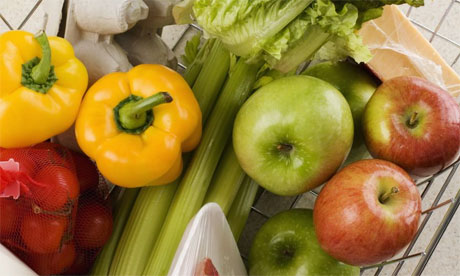
Cutting down on red meat and alcohol while eating more fruit and vegetables could prevent thousands of cancer cases each year, a new report said today.
A major study from the World Cancer Research Fund (WCRF) found that an estimated 39% of 12 major cancers could be prevented by adopting a healthy lifestyle.
This included almost half (43%) of cases of bowel cancer and 42% of breast cancer cases.
Increasing the amount of fresh vegetables and fruit in the diet and cutting down on alcohol could prevent 67% of cases of mouth, pharynx and larynx cancer each year, the report said.
This is equivalent to more than 3,300 cases each year in the UK.
For cancer of the oesophagus, 75% of cases (around 5,800 cases a year) could be prevented with increased intake of fruit and vegetables, less alcohol and maintaining a healthy weight.
Almost half (45%) of cases of stomach cancer (around 3,500 cases a year) could be cut by less salt and more fruit and vegetables.
Meanwhile, 41% of cases of pancreatic cancer (3,100 cases a year) could be prevented if people kept their weight in check and ate more foods containing folate, such as green vegetables, brown rice and fortified breakfast cereals.
Bowel cancer cases could be cut by 43% (around 15,700 cases a year) if people ate more fibre, cut down on red and processed meats and alcohol and increased their exercise levels while keeping their weight within a healthy range.
Almost one in five (19%) kidney cancer cases could be prevented by keeping weight in check (around 1,400 new cases a year) while 42% of breast cancer cases (around 19,100 cases a year) could be prevented by cutting down on alcohol, increasing exercise and keeping weight in check.
The report, Policy and Action for Cancer Prevention, was written by 23 experts from around the world.
The WCRF recommends that people wishing to help prevent cancer should:
• Keep themselves as lean as possible without becoming underweight;
• Eat five portions of fruit and vegetables each day;
• Be physically active for at least 30 minutes every day;
• Avoid sugary drinks;
• Cut down on processed foods high in added sugar or fat, or low in fibre;
• Limit red meats (such as beef, pork and lamb) and avoid processed meats;
• Drink no more than two units of alcohol a day (for men) or one unit (for women);
• Limit salt intake;
• Avoid using vitamin supplements to protect against cancer.
The report also calls on world governments, media, industry, individuals and workplaces to encourage exercise and cut down on unhealthy foods.
It said governments should use legislation and pricing to discourage people from eating unhealthy food while encouraging healthy eating.
Professor Sir Michael Marmot, chair of the WCRF panel, said: "This report shows that by making relatively straightforward changes, we could significantly reduce the number of cancer cases around the world.
"When people think of policy reports, they often think they are only relevant to governments.
"But while governments are important in this, the evidence shows that when it comes to cancer prevention, all groups in society have a role to play.
"This report is relevant to everyone from heads of government to the people who do the weekly food shopping for their family."
Professor Martin Wiseman, project director of the report, said: "On a global level every year, there are millions of cancer cases that could have been prevented and this is why we need to act now before the situation gets even worse.
"We are expecting a substantial increase in cancer rates with the ageing population, obesity rates soaring, and with people becoming less active and increasingly consuming highly processed and energy-dense foods and drinks.
"The good news is that this is not inevitable and we still have the chance to avert a crisis before it is too late."
Professor Mike Richards, the government's cancer tsar, said: "The evidence linking diet, physical activity, obesity and cancer has become stronger over the last decade and this report can play a part in people adopting healthier lifestyles.
"After not smoking, it is clear that diet, physical activity and weight are the most important things people can do to reduce their cancer risk."
Richard Davidson, director of policy and public affairs for Cancer Research UK, said: "Around 13,000 cancer cases in the UK are linked to being overweight or obese.
"And even more are linked to poor diets, drinking too much alcohol and not doing enough exercise. After smoking, these are some of the biggest preventable causes of cancer.
"Doing nothing could be disastrous."

